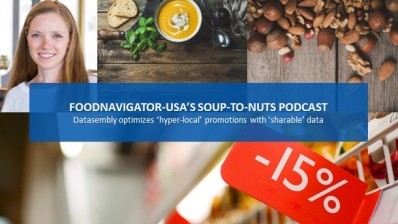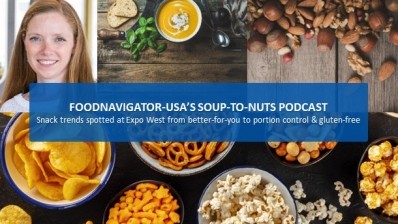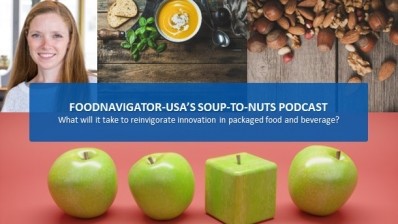Soup-To-Nuts Podcast: Water stewardship, usage claims could be tiebreaker between competing products for sustainability-minded consumers

By next year, the Food and Agriculture Organization predicts 1.8 billion people will face “absolute water scarcity” and two-thirds of the global population will grapple with water stress – a dire prediction for all that also hits hard the food and agri-business industry, which accounts for 70% of all freshwater withdrawals.
Consumers and retailers are taking note. According to research from Innova Market Insights, three-quarters of shoppers believe companies should use natural resources more carefully. Of the top “nature-related” claims Innova reports are piquing consumer interest are water usage and ocean protection, both which 38% of US and European shoppers said they seek. This is just one percentage point lower than the top nature-related claim of animal welfare.
Whole Foods Market also forecast water conservation and stewardship will rise in 2024, according to its most recent annual trends list, which often drives change just as much as it predicts it.
Food and beverage manufacturers are responding by setting ambitious water stewardship goals and, according to Innova, making 40% more water usage claims on pack over the last four years.
But is this enough? And what will it take to reduce reliance on fresh water and further reduce water-waste and pollution? In this episode of FoodNavigator-USA’s Soup-To-Nuts podcast, Ecolab Chief Sustainability Officer Emilio Tenuta shares strategies for food and beverage manufacturers to conserve and repurpose water to achieve their sustainability goals.
[Editor’s note: Never miss an episode of FoodNavigator-USA’s Soup-To-Nuts podcast – subscribe today.]
‘At the heart of the climate crisis is water,’ and consumers want answers
Citing a recent New York Times data investigation, Tenuta says America is draining its underground aquifers faster than nature can replace it with four in 10 sites hitting all-time lows in the last year.
This is bad news for everyone, but it is especially bad for the food and beverage industry, which relies on water at every step of its supply chain – from the farms where crops are grown to how ingredients are processed and stored safely and how facilities are kept clean.
As such, Tenuta says, food and beverage companies need climate change plans that not only address how they will reduce their reliance on fresh water, but also how they must adapt their operations and supply chains to account for climate change related to lower water levels.
“At the heart of the climate crisis is water, and the way we experience the effects of climate change is through water. And so there are broad implications, not only for business, but also the communities where we live,” which is pushing consumers to seek companies with solutions, he said.
Getting started: Identify where water comes from, how much is used
According to Tenuta, improving water stewardship begins with identifying where water comes from and how much a company uses.
The next step to make a business case for reducing fresh water and reusing water where possible is by linking water use to the company’s other costs, like energy and liabilities.
Finally, he says, company’s need to “look beyond their fences” at how their water use, and that of their partners, impacts the broader supply chain and ecosystem.
While most companies can easily tackle the first step in creating an effective water stewardship program, which is identifying the source of their water, Tenuta says many companies stumble on the second step – measuring how much water they use.
This is where he says EcoLab can help with its Water Flow Intelligence powered by ECOLAB3D to provide real-time visibility into operations at the enterprise, site and asset levels. In addition, Tenuta says, EcoLab’s 3D TRASAR technology can help optimize water use with clean-in-place wash and alerts.
“Our 3D TRASER technology [uses] sensors to measure the water chemistry of different systems, whether it be a cooling system or a heating system, and optimize the water chemistry, along with being able to manage the amount of water that is being used to deliver the result,” which ultimately allows a company to use less water or use it more efficiently, he said.
Case studies: Kraft Heinz, Cargill reduce water use, save energy and avoid safety problems
By using 3D TRASER Clean-in-Place Technology, Tenuta said that Kraft Heinz was able to identify and fix several issue, including a leak in a heat exchanger valve, reduce wash times and lower sanitizer chemical use by 50%. When all was said and done, EcoLab said the technology helped Kraft Heinz save upwards of $244,000 in energy costs and prevent potential food safety problems by identifying 1,800 emerging issues.
Ecolab also used its 3D TRASAR Technology to help ingredient supplier Cargill reduce its freshwater intake without compromising stability or reliability at one of its non-GMO sunflower and soybean oil facilities in France, where droughts have increased in recent years.
As Tenuta explains, by using Ecolab’s 3D TRASAR Technology and Nalco Water’s Oxidant Controller, the plant was able to repurpose 93% of its wastewater for its cooling system, which helped replace 53% of the cite’s freshwater consumption in the cooling system.
Reflecting on these examples, and the benefits to the planet and businesses’ bottom lines, Tenuta encourages more food and beverage companies to evaluate and enhance their water stewardship – noting yesterday’s actions will not meet tomorrow’s objectives.
For more information on how Ecolab could help, Tenuta encourages stakeholders to visit ecolab.com to talk with one of the company’s 25,000 associates – half of whom are in the field working alongside consumers.










